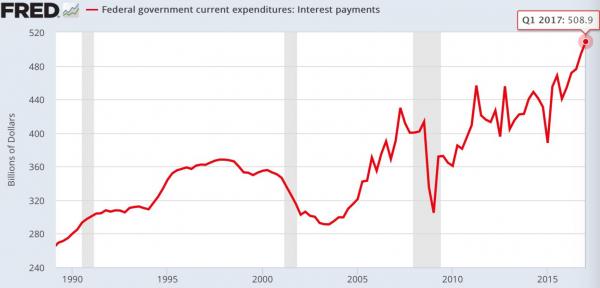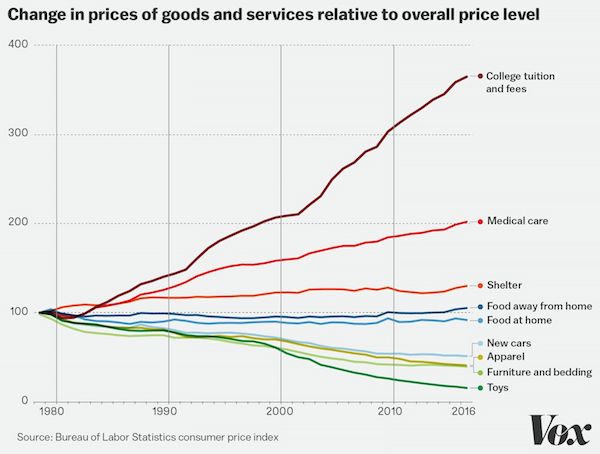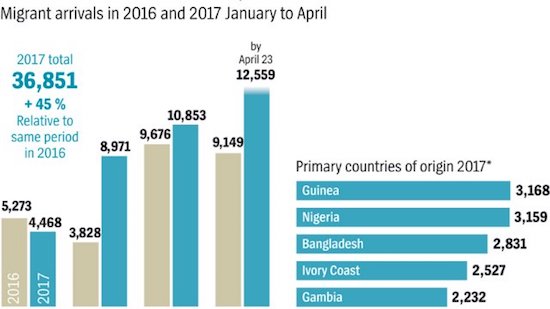
Fred Stein Under the El New York 1949

This could take a while. And that’s a good thing.
• Senate GOP to Snub House Obamacare Repeal Bill and Write Its Own (BBG)
Several key Senate Republicans said they will set aside the narrowly passed House health-care bill and write their own version instead, a sign of how difficult it will be to deliver on seven years of promises to repeal Obamacare. Lamar Alexander of Tennessee, who chairs the Senate health committee, and Roy Blunt of Missouri, a member of GOP leadership, both described the plan, even as the House was celebrating passing its repeal after weeks of back and forth. The decision will likely delay even further the prospect of any repeal bill reaching President Donald Trump’s desk. Hospital stocks dipped on the House vote, but quickly bounced back on the news the Senate would start over with its own version, with the BI North America Hospitals Index up 0.9% at 2:39 p.m. Hospitals fear the winding-down of Obamacare’s Medicaid expansion will leave them with more customers who can’t afford to pay.
Trump celebrated the House vote with a news conference at the White House, standing alongside dozens of Republican lawmakers. “This has really brought the Republican Party together,” he said. But in the wake of the House’s razor-thin 217-213 vote, the Senate made clear it was going in a different direction. Alaska’s Lisa Murkowski, who has been very critical of the House bill, said Thursday she hopes they start with “a clean slate” in the Senate. To get some kind of bill through his chamber, Majority Leader Mitch McConnell will need to unite moderate and conservative wings of the party that want to pull the measure in entirely different directions. The GOP controls the chamber 52-48, meaning he can lose no more than two Republicans and still pass it, given the united Democratic opposition.

At ZIRP.
• Cost Of Interest On US Government Debt Tops Half A Trillion Dollars (ZH)
With debt ceilings, spending plans, and tax reforms focusing all eyes on Washington, we thought it notable that for the first time in US history, the cost of interest on US government debt has risen above half a trillion dollars… One wonders, given the grandiose spending plans, if we will ever get back below half a trillion dollars?


We’ve been saying all along OPEC cuts were fantasy. US shale is a minor factor. Lack of demand is a major one.
• Oil Extends Slump Below $45 (BBG)
Oil slid below $45 a barrel for the first time since OPEC agreed to cut output in November as U.S. shale confounds the producer group’s attempts to prop up prices. Futures have collapsed 11% this week, slumping to the lowest since Nov. 15 – two weeks before OPEC agreed to production curbs to boost prices and ease a global glut. The decline is being driven by expanding U.S. output that’s countering the group’s curbs. Energy companies in Asia slumped on Friday, after their American counterparts were hammered in the previous session. While news of OPEC’s cuts drove prices in early January to the highest since July 2015, that increase encouraged U.S. drillers to pump more.

The result has been 11 straight weeks of expansion in American production in the longest run of gains since 2012. Prices are still more than 50% below their peak in 2014, when surging shale output triggered crude’s biggest collapse in a generation and left rival producers such as Saudi Arabia scrambling to protect market share. “There’s disappointment that the production cuts we’ve seen from OPEC and others has not had any impact at this stage on global inventory levels,” said Ric Spooner, a chief market analyst at CMC Markets in Sydney. “The market seems to be much further away from a balanced situation than some had previously forecast. There is a possibility that oil could be headed to the low $40s range from here.”


Expecting the dollar to fall. Doesn’t look all that wise.
• Emerging-Market Companies Binge On Dollar-Denominated Debt (BBG)
Emerging-market companies are showing up to the U.S. debt market at the fastest pace ever, and finding plenty of appetite for their bonds. Sales of dollar-denominated notes have climbed to about $160 billion this year, more than double offerings at this point in 2016 and the fastest annual start on record, according to data compiled by Bloomberg going back to 1999. Emerging-market assets tanked after Donald Trump’s surprise election in November, but they’ve quickly recovered, with bonds returning 4% this year and outperforming U.S. investment-grade and high-yield debt. The deluge of issuance began when companies anticipating a surge in borrowing costs amid economic stimulus from Trump rushed to sell notes before his inauguration Jan. 20.
But the expected jump never materialized, extending the window for companies like Petroleo Brasileiro SA and Petroleos Mexicanos to pursue multi-billion-dollar deals. They found plenty of demand from investors keen to buy shorter-dated debt that’s better insulated against rising U.S. interest rates. Jean-Dominique Butikofer, the head of emerging markets for fixed income at Voya Investment Management in Atlanta, said he’s seen new interest in emerging markets from investors who already own U.S. high-yield bonds or emerging market sovereign debt that’s more vulnerable to rising interest rates. “You want to be less sensitive to U.S. rates, but you still want to diversify and you still want to play the EM catch-up growth story,” said Butikofer, whose firm manages $217 billion. “You’re going to gradually add emerging-market corporates.”


There should never be something like a pesticides and seeds group. Break them up.
• Chemchina Clinches Landmark $43 Billion Takeover of Syngenta (R.)
ChemChina has won more than enough support from Syngenta shareholders to clinch its $43 billion takeover of the Swiss pesticides and seeds group, the two companies said on Friday. The deal, announced in February 2016, was prompted by China’s desire to use Syngenta’s portfolio of top-tier chemicals and patent-protected seeds to improve domestic agricultural output. It is China’s biggest foreign takeover to date. It is one of several deals that are remaking the international market for agricultural chemicals, seeds and fertilisers. The other deals in the sector are a $130 billion proposed merger of Dow Chemical and DuPont, and Bayer’s plan to merge with Monsanto. The trend toward market consolidation has triggered fears among farmers that the pipeline for new herbicides and pesticides might slow.
Regulators have required some divestments as a condition for approving the Syngenta deal. Based on preliminary numbers, around 80.7% of Syngenta shares have been tendered, above the minimum threshold of 67% support, the partners said in a joint statement. [..] The transaction is set to close on May 18 after the start of an additional acceptance period for shareholders and payment of a special 5-franc dividend to holders of Swiss-listed shares on May 16. Holders of U.S.-listed depositor receipts will get the special dividend in July. Syngenta shares will be delisted from the Swiss bourse and its depository receipts from the New York Stock Exchange. Chief Executive Erik Fyrwald played down the transition from publicly listed group to becoming part of a Chinese state enterprise, stressing that Syngenta would remain a Swiss-based global company while under Chinese ownership.

May has nothing, election or not. “..the 30-minute slot that we are going to devote to Brexit per week, for this week it’s up.”
• Brexit Talks Could Become ‘Impossible’: EU Council President Tusk (Ind.)
The President of the EU’s ruling Council has intervened to calm Brexit tensions 24 hours after Theresa May launched a vicious attack on “Brussels bureaucrats” on the steps of No 10. Donald Tusk warned that talks would become “impossible” if emotions got out of hand between the UK and EU and called for “mutual respect” between the negotiating parties. The call for calm comes after Theresa May accused the EU’s bureaucracy of trying to influence the result of Britian’s general election by maliciously leaking the content of discussions to the media. In an aggressive speech on Wenesday she tore into officials, warning that her government would not let “the bureaucrats of Brussels run over us”.
The European Commission this morning reacted indignantly to Ms May’s conspiracy theory, with a spokesperson telling reporters that the organisation was “rather busy” and preoccupied with more important matters than trying to fix the poll. But Mr Tusk, a Polish national who represents the EU states’ heads of government in Brussels, said on Thursday afternoon: “Brexit talks [are] difficult enough. If emotions get out of hand, they’ll become impossible. Discretion, moderation and mutual respect needed. “At stake are the daily lives and interests of millions of people on both sides of the Channel.”
The call for calm contrasts with that of a Commission spokesperson earlier today, who said: “We are not naive, we know that there is an election taking place in the United Kingdom. People get excited whenever we have elections. “This election in the United Kingdom is mainly about Brexit. But we here in Brussels, we are very busy, rather busy, with our policy work. “We have too much to do on our plate. So, in a nutshell, we are very busy. And we will not Brexitise our work. “To put it in the words of an EU diplomat, the 30-minute slot that we are going to devote to Brexit per week, for this week it’s up.”

10 years too late? 20?
• Italy’s Bankrupt National Airline Is Being Put Up For Sale (Ind.)
Alitalia will be put up for sale in two weeks having earlier this week fallen into administration. In a radio interview cited by the Financial Times, Carlo Calenda, the country’s economic development minister, said that the priority is for the whole company to get bought. “Within 15 days the commissioners will be open to expressions of interest,” he said. On Tuesday, Alitalia started bankruptcy proceedings for the second time in a decade after employees rejected job cuts and concessions linked to a €2bn recapitalisation plan. Shareholders voted unanimously to file for special administration. According to the Financial Times, the government of Prime Minister Paolo Gentiloni has extended a bridge loan of €600m to keep Alitalia afloat for the next six months, but has ruled out nationalisation.
This loan should give the commissioners appointed by the government time to come up with a strategy that will ensure the airline’s fleet is not grounded. Speaking to the broadcaster, Mr Calenda said the €600m loan would be the “maximum” of state aid on offer. Speaking about possible buyers, Mr Calenda said “any idea is welcome”. He stressed, however, that “Alitalia needs an alliance with a big European group”. Alitalia, whose major shareholders are Abu-Dhabi based Etihad Airways and Italian banks, has about 12,500 employees. It has been struggling ever since a previous bankruptcy in 2008.

Somone will buy it for pennies on the buck. China?
• Italy’s Rescue Of Its Airline Comes At Great Cost To The Economy (BBG)
Given its rich history, Italy is rightly attached to its relics. Unfortunately, this affection for the past does not stop at the Colosseum: It applies to failing companies too. Take Alitalia, Italy’s loss-making flag carrier, which has survived for years thanks to a string of public and private rescues. On Tuesday, the airline went into administration, prompting the government to provide a fresh loan worth €600 million ($655 million) to guarantee another six months of operation. Surely the time has come for Italy to stop losses. Unless Alitalia can find a buyer, the government should allow it to go bust. Politically, that is a tall order, of course. Politicians want to protect workers, who stand to lose their jobs if a company shuts down. But every euro used in a bailout is one that can’t be spent elsewhere; what economists call “opportunity cost.” How many more jobs could have been created had the government invested €600 million into upgrading Italy’s digital infrastructure?
Keeping Alitalia alive is also a burden on productivity, since it takes resources that might be deployed by more efficient competitors. Last year, a study for the European Commission found that the misallocation of workers and capital in Italy has steadily worsened since 1995, accounting for a large fraction of Italy’s productivity slowdown. If the government is serious about Italy returning to sustainable growth, it should stop helping losers get in the way of productive companies. There are also questions of financial stability. Between 1974 and 2014, Italian taxpayers have spent €7.4 billion propping up Alitalia, according to Mediobanca. Italy’s addiction to helping companies in trouble has contributed to its huge government debt, which now stands at nearly 133% of GDP, exposing Rome to the risk of a financial crisis.
The same problem also applies to banks. From UniCredit to Intesa Sanpaolo, many of Italy’s big lenders have granted hundreds of millions in credit lines to Alitalia, only to see their loans go up in smoke. The list also includes Monte Dei Paschi di Siena, the troubled bank which in December had to apply for a multi-billion euro government bailout. The reason? It was struggling under the weight of non-performing loans, like those it provided to Alitalia. While European rules on state aid will make it difficult for Rome to help Alitalia beyond the initial six months, one should never underestimate the ability of the Italian government to find a way to stitch together another flawed rescue. But if Italy is to finally start focusing on future growth, it will have to stop dwelling on the ruins of the past.

A great economist died.
• Baumol’s Cost Disease Explains A Lot About Our Economies (Vox)
William Baumol — an economist who just died at the age of 95 — had a famous idea, commonly known as Baumol’s cost disease, that explains a lot about our modern world. It explains why barbers make more in San Francisco than in Cleveland and why services such as health care and education keep getting more expensive. And it provides a possible explanation for why rich countries like America are devoting more and more of their workforces to low-productivity services, dragging down the economy-wide rate of productivity growth. In the 1960s, Baumol was trying to understand the economics of the arts, and he noticed something surprising: Musicians weren’t getting any more productive — playing a piece written for a string quartet took four musicians the same amount of time in 1965 as it did in 1865 — yet musicians in 1965 made a lot more money than musicians in 1865.
The explanation wasn’t too hard to figure out. Rising worker productivity in other sectors of the economy, like manufacturing, was pushing up wages. An arts institution that insisted on paying musicians 1860s wages in a 1960s economy would find their musicians were constantly quitting to take other jobs. So arts institutions — at least those that could afford it — had to raise their wages in order to attract and retain the best musicians. The consequence is that rising productivity in the manufacturing sector of the economy inevitably pushes up the cost of labor-intensive services like live musical performances. Rising productivity allows factories to cut prices and raise wages at the same time. But when wages rise, music venues have no alternative but to raise ticket prices to cover the higher costs.
This became known as Baumol’s cost disease, and Baumol realized that it had implications far beyond the arts. It implies that in a world of rapid technological progress, we should expect the cost of manufactured goods — cars, smartphones, T-shirts, bananas, and so forth — to fall, while the cost of labor-intensive services — schooling, health care, child care, haircuts, fitness coaching, legal services, and so forth — to rise. And this is exactly what the data shows. Decade after decade, health care and education have gotten more expensive while the price of clothing, cars, furniture, toys, and other manufactured goods has gone down relative to the overall inflation rate — exactly the pattern Baumol predicted a half-century ago.

Baumol’s cost disease is a powerful tool for understanding the modern economic world. It suggests, for example, that the continually rising costs of education and health care isn’t necessarily a sign that anything has gone wrong with those sectors of the economy. At least until we invent robotic professors, teachers, doctors, and nurses, we should expect these low-productivity sectors of the economy to get more expensive. While some argue that prices keep rising because the government subsidizes health care through programs like Medicare and college educations through student loans and grants, you see the same basic pattern with services like summer camps, veterinary services, and Broadway shows that aren’t hamstrung by government regulations and subsidies.

Putin keeps his enemies close.
• Russia Set to Police Syria Safe Zones Backed by Iran, Turkey (BBG)
Russia said it’s ready to send peacekeepers to Syria as it won backing from Turkey and Iran for a plan to establish safe zones inside the war-torn country in an effort to shore up a shaky cease-fire brokered by the three powers. The three countries signed a memorandum on the creation of so-called de-escalation areas on Thursday after two days of talks in Kazakhstan that also included representatives of the Syrian government and rebel groups. Opposition leaders distanced themselves from the plan, saying they can’t accept Iran as a guarantor of the truce and that they want “clear and tangible” guarantees the deal will be enforced. The U.S. also expressed doubts. “Russia is ready to send its observers” to help enforce the safe zones, President Vladimir Putin’s envoy to Syria, Alexander Lavrentiev, told reporters in the Kazakh capital, Astana. “We believe the Syrian crisis can only be resolved through political methods.”

Putin said on Wednesday that he’d secured the backing of U.S. President Donald Trump for the proposal, which could include a ban on bombing raids. But State Department spokeswoman Heather Nauert said Thursday that the U.S. has “concerns” about the accord, “including the involvement of Iran as a so-called “guarantor,”’ and said Russia should do more to stop violence. [..] The latest initiative would establish four zones patrolled by foreign forces – possibly including Russian ones – in the northwestern Idlib province, Homs province in the west, the East Ghouta suburb of the capital Damascus and southern Syria. It will take a month to finalize the maps of the proposed safe zones, Iranian Deputy Foreign Minister Hossein Jaberi Ansari said. The United Nations’ Special Envoy for Syria, Staffan de Mistura, who also attended the Astana talks, described the agreement as a “step in the right direction.”

That’ll go down well with Wolfowitz et al.
• Syria Safe Zones To Be Shut For US, Coalition Planes (R.)
The safe zones which are being created in Syria will be closed for warplanes of the United States and those of the U.S.-led coalition, Russian news agencies quoted Russian envoy at Syria peace talks Alexander Lavrentyev as saying on Friday. Turkey and Iran agreed on Thursday to Russia’s proposal for “de-escalation zones” in Syria, a move welcomed by the United Nations but met with scepticism from the United States.

Stop selling rubber boats, problem solved!
• EU Wants China’s Help To Stop Boats Being Used By Migrants (R.)
The European Union wants China to help prevent migrants and refugees using Chinese-made inflatable boats to get into the bloc by stopping the boats reaching them, the European Commissioner for Migration said on Thursday. Dimitris Avramopoulos, speaking to reporters in Beijing after meeting Chinese Minister for Public Security Guo Shengkun, said the rubber boats used by people smugglers were made in China. “The rubber boats used by the smuggler networks in the Mediterranean are fabricated somewhere in China, they are exported to the countries in Asia and they are used by them,” Avramopoulos said.
“So I requested the support and cooperation from the Chinese authorities in order to track down this business and dismantle it, because what they produce is not serving the common good of the country. It is a very dangerous tool in the hands of ruthless smugglers.” He gave no further details, but said he and Guo had not discussed the possibility of China taking any of the refugees or migrants. More than a million people sought asylum in Europe’s rich north in 2015, mostly in Germany but also in large numbers in Sweden, straining the capacity of countries to cope. A contentious deal with Turkey to stop Syrian refugees from reaching Greece and the overland route to Germany, in return for EU funds, has reduced flows to a trickle, though thousands of migrants still try to reach Europe from Libya via sea routes.

Who cares about the law? “..a more restrictive interpretation of asylum rights..”
• EU Seeks to Ward Off New Refugee Crisis (Spiegel)
Merkel has promised that the refugee crisis seen two years ago will not be repeated: Never again will Europe see an uncontrolled inflow of millions of people. The refugee deal with Turkey is working, we are repeatedly told, and the crisis is over. That, though, could turn out to be wrong. With German voters set to go to the polls on Sept. 24, Merkel’s re-election campaign hinges on there not being a repeat of the refugee crisis, even if it’s not as substantial as the 2015 influx. But west of the closed Balkan route, a new migrant stream has been growing since the beginning of the year. From Jan. 1 to April 23, 36,851 migrants have followed the central Mediterranean route from North Africa to Italy. That represents a 45% increase over the same period last year, when a record 181,000 people crossed the Mediterranean on the route.
Even more concerning is the fact that summer hasn’t even begun. Experience has shown that most migrants only climb into the boats once the Mediterranean grows calmer. Italian authorities estimate that a quarter million people will arrive on its shores this year. “There are challenges ahead,” says a senior German security official. Berlin is particularly concerned because it’s not just Africans who are taking the Mediterranean route to Italy. An increasing number of South Asians are as well, which could mean that the route across the sea to Italy is now seen as a viable alternative to the defunct Balkan route. People from Bangladesh now represent the second largest group of migrants that have crossed over from Libya this year. From January to March 2016, by contrast, exactly one Bangladeshi was picked up on the route. Pakistanis have also chosen the Mediterranean route more often in recent months.

[..] The EU is currently working on an emergency plan in case a “serious crisis situation” develops. The discussions are focusing on a scenario under which more than 200,000 refugees would have to be redistributed each year. An unpublished report by Malta, which currently holds the rotating European Council presidency, calls for a more restrictive interpretation of asylum rights in such a case. In other words, should too many migrants begin arriving, the EU will increase efforts at deterrence. Controversial proposals for reception camps to be established in North Africa also remain under discussion. Most of those currently fleeing from countries like Nigeria, Guinea and the Ivory Coast are doing so to escape grinding poverty and in the hopes of finding better opportunities in Europe. Very few of them have much chance of being granted asylum. That reality has made redistribution within the EU even more difficult. According to current law, those with no chance at asylum are supposed to be sent back home as quickly as possible and not sent to other European countries.

Now add a huge rise in arrival numbers.
• Tensions Boiling Over On Greece’s Chios Amid Absence Of Migrant Facility (K.)
Tensions are rising on the eastern Aegean island of Chios, which is currently favored by human smugglers ferrying migrants over from neighboring Turkey, with an increasing number of brawls at overcrowded state reception centers and local residents’ tolerance wearing thin. Clashes between migrants of different ethnicities are an almost daily occurrence, residents said following a violent confrontation on Tuesday night between Afghan and Algerian nationals at the Vial reception facility. That incident started as a fight between two small groups throwing stones at each other and escalated into a full-blown brawl involving around 60 people. Riot police stationed nearby were eventually obliged to enter the facility and break up the fight.
According to sources at the Citizens’ Protection Ministry, migrants have been arriving in greater numbers on Chios as it still lacks a so-called pre-departure camp due to protests by local residents against the creation of new facilities on the island. As a result, migrants landing on Chios and deemed ineligible for asylum are not being deported to Turkey as foreseen in an agreement signed between Turkey and the EU in March last year. Around 200 migrants have arrived on Chios this week, according to government figures, compared to virtually none on other islands in the eastern Aegean. And, according to a top-ranking police official, the problem is unlikely to be resolved until a center is set up. “The message being sent to those deciding to make the journey is that if you get to Chios they won’t send you back,” he said.

NGOs to be thrown off the islands this summer, Greek army and the Greek Red Cross to take over.
• Greece Paying Asylum Seekers To Reject Appeals (EUO)
The Greek government is giving cash incentives for rejected asylum seekers on the islands to forgo their legal rights to appeal their cases. Some €1,000 and free plane tickets home are now part of a largely EU-financed package to send them packing as quickly as possible. “This is quite complicated and quite immoral,” a Greek lawyer working for Save the Children, an international NGO, told EUobserver on Tuesday (2 May). The move is part of a larger effort to return people to Turkey and free up administrative bottlenecks, but the plan has generated criticism from human rights defenders who say asylum seekers are being pushed into taking the money. People have five days to decide whether to take the cash, with reports emerging that even that short delay was not being respected by authorities. Previously, people were entitled to the assistance even if they appealed.
The scheme only applies to those in so-called eu hotspots on the Chios, Kos, Leros, Lesvos, and Samos islands, where arrivals are screened, given that Turkey does not accept people back from mainland Greece. Greek minister of migration Ioannis Mouzalas has said the financial bait was needed to prevent bogus claimants from abusing the asylum system. The new rules on excluding people who appeal their cases, imposed last month, also come after the European Commission pressured Athens into shortening its appeal process and removing administrative barriers to send more people home. The EU-Turkey deal last year was supposed to ensure that new asylum arrivals whose applications have been declared unfounded would be returned to the country. But only around 1,500 have been sent back since its launch, with the Greek appeals system consistently ruling in favour of initially rejected asylum seekers over broader concerns that Turkey was not safe.
[..] The whole appears to be part of bigger plan to squeeze asylum-seeker rights on the islands and get them out of Greece as fast as possible. It also comes on the heels of a new plan that aims to boot NGOs from the islands. “Many NGOs will longer be on the islands after July, it means there is going to be a lot less scrutiny and a lot less visibility on what is going on as well,” said Claire Whelan from the Norwegian Refugee Council, an independent humanitarian organisation. NGOs working in the medical field in the Vial hotspot in Chios island have already been replaced by the Greek army and the Greek Red Cross. All were informed earlier this year that DG ECHO, the EU Commission’s humanitarian branch, would no longer fund them. Instead, the money will be coming from the Commission’s interior and security department, DG Home. “One of the biggest gaps we see, that remains, is access to legal assistance and legal counseling. And I don’t know if that will be funded under DG Home and the government,” the Norwegian Refugee Council’s Whelan said.

Europe doesn’t care what Greece wants.
• Greece Says Has Done Its Bit, Now Wants Debt Relief (R.)
Prime Minister Alexis Tsipras called on Greece’s international lenders on Thursday to reach an agreement on easing its debt burden by May 22, when eurozone finance ministers meet in Brussels to discuss the country’s bailout progress. Athens and its creditors reached a long-awaited deal at staff-level this week on a series of bailout reforms Greece needs to unlock loans from its €86 billion rescue package, the country’s third since 2010. The EU and the IMF, which has yet to announce if it will participate in the bailout, have now started negotiations over Greece’s post-bailout fiscal targets, a key element for granting it further debt relief. Greece is being firm that it has done what was asked of it and now wants to see movement from the other side. “Medium-term debt relief measures must be clearly defined by the May 22 Eurogroup meeting,” Tsipras told his cabinet on Thursday.
“Greece has done its part and all parties must now fulfill their commitments.” The creditors have been not been quite as upbeat and there is no guarantee that the May 22 meeting will actually sign off on the new tranche of loans, let alone draft up debt relief. But Luxembourg Finance Minister Pierre Gramenga did cite progress when speaking to reporters on the sidelines of a conference in Luxembourg. “We’re one step closer. They [Greece] over-performed last year, they are on track this year, we have now an agreement looming that we will hopefully agree on in Eurogroup,” he said. “Those who have been pessimistic all the time have been proved wrong. I’m very pleased about that. The worst case is not always the scenario that plays out.” Greece’s economy and budget have improved markedly recently, although major problems of poverty and unemployment persist.

Additional 18% cuts to come.
• Greek Pensioners’ Network Lists 23 Cuts Inflicted On Benefits (K.)
At least 23 cuts have been inflicted on pensioners since 2010, with losses adding up to more than €50 billion. For some, their benefits have fallen by as much as 50%. The United Pensioners network has just added a 23rd cut to its list – the reduction of up to 18% of main and supplementary pensions agreed by the government this week. Network chief Nikos Hatzopoulos says the cuts have impoverished pensioners. The other 22 cuts on the list are as follows:
– In 2010, Christmas, Easter and holiday bonuses ended.
– In 2011, all pensioners under the age of 60 took a 6-10% cut.
– In the same year, pensioners were also slapped with a solidarity levy ranging from 3 to 13% for monthly pensions over €1,400. Also cuts to supplementary pensions started, from 3 to 10%.
– Main pensions to under-60s were slashed in 2011 and supplementary pensions of more than 150 euros a month fell by 15-30%.
– From January 2012, there were fresh cuts to any “high” pensions not affected until then.
– In 2012, monthly pensions over 1,000 euros were hit with a new cut.
– Summer 2014 saw a 5.2% cut to all supplementary pensions.
– In 2015, minimum pensions fell.
– In the same year, all early retirements incurred a 10% cut.
– From last May, all new pensioners were informed they would get up to 30% less.
– Some 250,000 supplementary pensions fell by up to 40%.
– The EKAS benefit to 160,000 low-income pensioners was ended.
– Civil servants’ share fund dividends were slashed 45%.
– High pensions took a retroactive cut from late 2016 to end-2018.
– Widows’ benefits fell and stricter criteria were introduced.
– The pensions of people with employment were slashed 60%.
– Early retirees took big cuts.
– Retirement lump sums shrank 15-20%.
– New disability pensions were slashed last May.
– The healthcare levy on main pensions rose.
– A similar 6% levy was imposed on supplementary pensions.
– Since January, 650,000 farmers have had to pay a 14% income levy.









Home › Forums › Debt Rattle May 5 2017